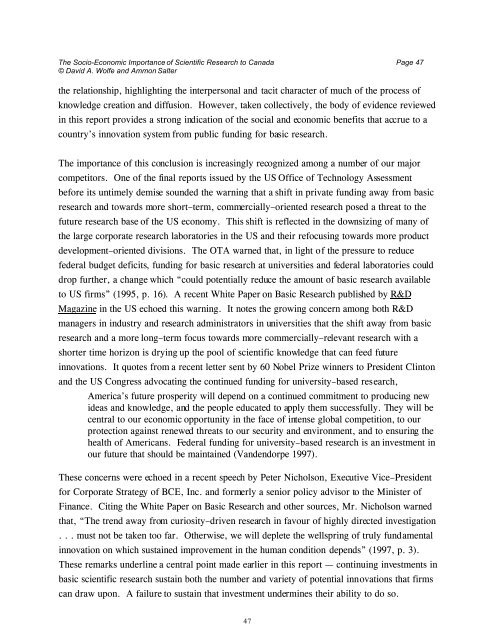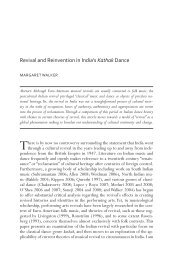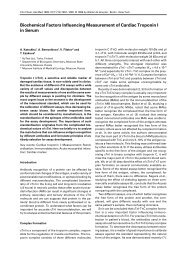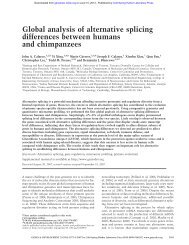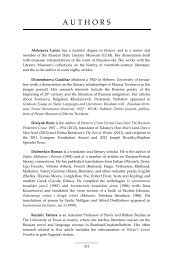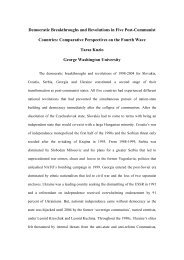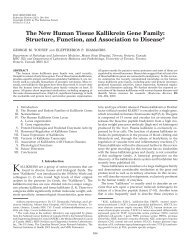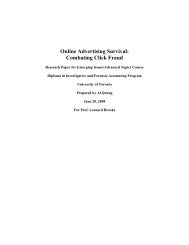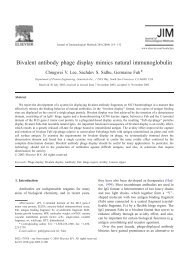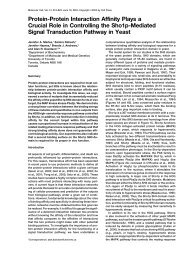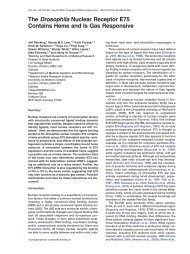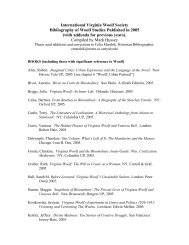The Socio-Economic Importance of Scientific Research To Canada
The Socio-Economic Importance of Scientific Research To Canada
The Socio-Economic Importance of Scientific Research To Canada
You also want an ePaper? Increase the reach of your titles
YUMPU automatically turns print PDFs into web optimized ePapers that Google loves.
<strong>The</strong> <strong>Socio</strong>-<strong>Economic</strong> <strong>Importance</strong> <strong>of</strong> <strong>Scientific</strong> <strong>Research</strong> to <strong>Canada</strong> Page 47© David A. Wolfe and Ammon Salterthe relationship, highlighting the interpersonal and tacit character <strong>of</strong> much <strong>of</strong> the process <strong>of</strong>knowledge creation and diffusion. However, taken collectively, the body <strong>of</strong> evidence reviewedin this report provides a strong indication <strong>of</strong> the social and economic benefits that accrue to acountry’s innovation system from public funding for basic research.<strong>The</strong> importance <strong>of</strong> this conclusion is increasingly recognized among a number <strong>of</strong> our majorcompetitors. One <strong>of</strong> the final reports issued by the US Office <strong>of</strong> Technology Assessmentbefore its untimely demise sounded the warning that a shift in private funding away from basicresearch and towards more short–term, commercially–oriented research posed a threat to thefuture research base <strong>of</strong> the US economy. This shift is reflected in the downsizing <strong>of</strong> many <strong>of</strong>the large corporate research laboratories in the US and their refocusing towards more productdevelopment–oriented divisions. <strong>The</strong> OTA warned that, in light <strong>of</strong> the pressure to reducefederal budget deficits, funding for basic research at universities and federal laboratories coulddrop further, a change which “could potentially reduce the amount <strong>of</strong> basic research availableto US firms” (1995, p. 16). A recent White Paper on Basic <strong>Research</strong> published by R&DMagazine in the US echoed this warning. It notes the growing concern among both R&Dmanagers in industry and research administrators in universities that the shift away from basicresearch and a more long–term focus towards more commercially–relevant research with ashorter time horizon is drying up the pool <strong>of</strong> scientific knowledge that can feed futureinnovations. It quotes from a recent letter sent by 60 Nobel Prize winners to President Clintonand the US Congress advocating the continued funding for university–based research,America’s future prosperity will depend on a continued commitment to producing newideas and knowledge, and the people educated to apply them successfully. <strong>The</strong>y will becentral to our economic opportunity in the face <strong>of</strong> intense global competition, to ourprotection against renewed threats to our security and environment, and to ensuring thehealth <strong>of</strong> Americans. Federal funding for university–based research is an investment inour future that should be maintained (Vandendorpe 1997).<strong>The</strong>se concerns were echoed in a recent speech by Peter Nicholson, Executive Vice–Presidentfor Corporate Strategy <strong>of</strong> BCE, Inc. and formerly a senior policy advisor to the Minister <strong>of</strong>Finance. Citing the White Paper on Basic <strong>Research</strong> and other sources, Mr. Nicholson warnedthat, “<strong>The</strong> trend away from curiosity–driven research in favour <strong>of</strong> highly directed investigation. . . must not be taken too far. Otherwise, we will deplete the wellspring <strong>of</strong> truly fundamentalinnovation on which sustained improvement in the human condition depends” (1997, p. 3).<strong>The</strong>se remarks underline a central point made earlier in this report — continuing investments inbasic scientific research sustain both the number and variety <strong>of</strong> potential innovations that firmscan draw upon. A failure to sustain that investment undermines their ability to do so.47


